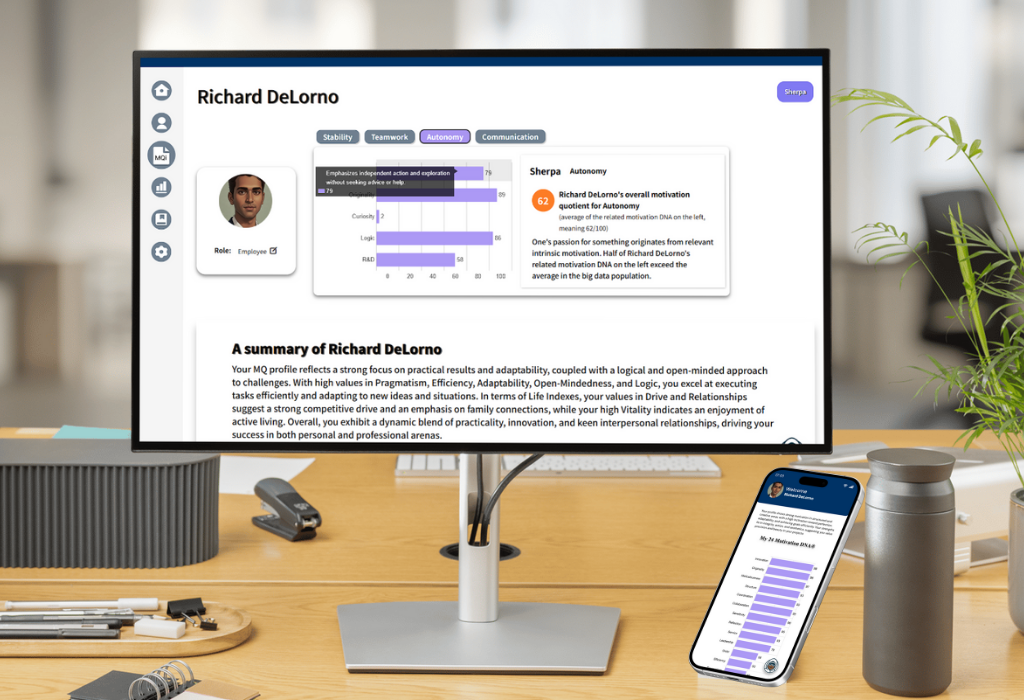
Turning Motivation DNA into Mission Success
People Centered. Data Driven. Using Motivation DNA to decode intrinsic motivation

From Scientific Roots to Real-World Business Impact
TalentMotives was founded to unlock the full potential of people by decoding their Motivation DNA—the building blocks of intrinsic motivation. Through our research-backed MQi framework and AI-powered Sherpa platform, we help organizations align their workforce with roles, relationships, and environments that ignite lasting engagement. From mid-20th-century experiments into intrinsic drive to the groundbreaking frameworks of Reiss, Ryan, and Deci—and onward to today’s AI-powered insights—our mission has always been to translate deep human understanding into workplace transformation. As our workforce has evolved across generations, so has our ambition: to make intrinsic motivators actionable, personalized, and accessible to every organization, regardless of size.
Our Mission is to empower organizations to cultivate a motivated, high-performing workforce by integrating cutting-edge motivational science into talent management practices. We believe that every individual has unique intrinsic motivations that, when properly understood and aligned with their role, can lead to exceptional productivity and job satisfaction.
Our corporate history traces and connects a century of research with 21st-century innovation to empower individuals and teams.
1970s- 1980s: TalentMotives' Scientific Roots – Self Determination Theory
In the mid-1970s, psychologist Edward L. Deci began experimenting with the effects of rewards on intrinsic motivation—discovering that external incentives like money could actually reduce internal drive. Alongside Richard M. Ryan, Deci co-founded what would become Self‑Determination Theory (SDT)—a powerful framework clarifying that intrinsic motivation depends on satisfying three universal psychological needs: autonomy, competence, and relatedness.
By 1985, Deci and Ryan laid this foundation in their seminal work, Intrinsic Motivation and Self‑Determination in Human Behavior, positioning SDT as a macro-theory that reshaped how we understand motivation across education, mental health, and the modern workplace.
1996: Steven Reiss & the 16 Basic Desires
A leap toward structured, intrinsic motivators
Building on the foundational work of Deci and Ryan, psychologist Steven Reiss conducted one of the first large-scale, cross-cultural studies of intrinsic motivation. With over 6,000 participants across four continents, he uncovered 16 universal motivational “dispositions,” including Curiosity, Independence, Power, Order, Acceptance, and Status.
He then operationalized this theory into the Reiss Motivation Profile (RMP)—a psychometrically validated tool designed to measure these motivational drives reliably. Reiss demonstrated its accuracy and real-world relevance through strong internal consistency and test–retest reliability—and linked each motivator to observable behaviors and outcomes.
Why Reiss Mattered
- Quantifiable motivators: He made intrinsic drives measurable and comparable.
- Behavioral insight: Each desire was empirically connected to real-life actions.
- Personalized motivation: His model showed that people carry unique blends of motivators, enabling highly individualized insight.
TalentMotives’ Connection to Reiss
- Expansion of the DNA model: Inspired by the RMP, TalentMotives extended this concept, mapping ~30 Motivation DNA traits to capture deeper nuance and clarity.
- Action-oriented design: We transformed his rigor into user-friendly tools—dashboards, coaching prompts, and visual reports accessible to managers and teams.
- Inclusive framework: Embracing the global reliability of Reiss’s research, TalentMotives designed solutions fit for diverse workforces across generations and cultures.
2000s–2010s: TalentMotives and the Research Validation & Workforce Evolution
Deepening the science and broadening application
As motivation theories matured, empirical validation grew stronger:
- Reiss’s 16 Basic Desires, refined by further psychometric and validation studies, solidified its cross-cultural reliability and behavioral relevance in education, counseling, and organizational settings.
- Self‑Determination Theory (SDT) expanded from lab research to a global framework illuminating how autonomy, competence, and relatedness drive motivation, performance, and well-being in domains from schools to workplaces.
Shifting Generational Dynamics
By the mid-2010s, workplaces comprised Baby Boomers through Gen Z simultaneously—creating unprecedented diversity in values, engagement styles, and motivational drivers. Traditional HR tools weren’t cutting it:
- One-size-fits-all personality and engagement surveys weren’t deep enough to capture individual “why.”
- Leaders needed robust, person-centric insight to engage varied talent effectively.
2020: TalentMotives Takes Form
- Identifying the gap: Around 2015, TalentMotives’ founders recognized that to manage a multi-generational workforce, leaders required tools that went beyond “who they are” into “why they engage.”
- Defining our purpose: Inspired by SDT’s universal needs and Reiss’s nuanced motivators, TalentMotives set out with the mission to make intrinsic motivators actionable, personalized, and affordable, especially for small and mid-sized teams sidelined by enterprise solutions.
2024: Launch of TalentMotives - Converging Science & Human-Centered Tech
Where theory meets innovation
By the early 2020s, two major breakthroughs set the stage for what TalentMotives envisioned:
- Reliable, valid intrinsic motivation metrics: Decades of rigorous research had produced refined assessment models—some extending beyond 16 motivators into richer ~30‑trait "Motivation DNA" frameworks, optimized through scenario‑based testing and large-scale validation.
- AI’s next frontier — Retrieval‑Augmented Generation (RAG): From initial Meta research in 2020, RAG emerged rapidly, with 51% enterprise adoption by 2024, outperforming traditional fine‑tuning in accuracy, real‑time grounding, and reduced hallucination.
These trends highlighted an opportunity: to combine scientifically grounded motivation assessments with explainable, real‑time AI insights.
TalentMotives Formalizes its Mission & Products (Incorporated 2024)
With the convergence of science and AI, TalentMotives issued its formal mission statement:
“To empower organizations to cultivate a motivated, high-performing workforce by integrating cutting-edge motivational science into talent management practices.
We believe that every individual has unique intrinsic motivations that, when properly understood and aligned with their role, can lead to exceptional productivity and job satisfaction.”
In 2024, TalentMotives incorporated and launched its first integrated platform, tailored for mid‑to‑small enterprises previously unable to access such advanced HR tech:
- MQi (Motivation Quotient Integration): A comprehensive assessment built on ~30 motivational DNA traits, driven by dynamic, scenario‑based questions that reduce bias.
- Sherpa: A RAG‑powered AI coach that translates complex MQi profiles into clear, conversational action plans rooted in motivation science, not generic AI guesses.
- Role‑Based Playbooks: Practical, customizable guides equipping managers with motivational alignment strategies in hiring, coaching, onboarding, and retention.
2024–2025: TalentMotives' Early Success & Vision
Early Adoption & Impact (2024–2025)
Shortly after launching in late 2024, TalentMotives saw rapid need from small and mid-sized businesses seeking deeper, AI-driven motivation insight:
- 55% of pilot users reported improved team engagement and clarity within one month of using MQi + Sherpa.
- 68% of managers indicated their hiring decisions were more aligned with candidates’ intrinsic motivators.
- 73% said Sherpa’s AI coaching drove real-time behavior change and reduced onboarding time.
Vision Ahead — Where We’re Headed (2025 and Beyond)
- Expanding the Toolkit – More Motivation DNA traits, deeper scenario complexity.
Role-Based Playbooks – Evolving toward full-cycle team-building and development strategies.
- Seamless Integrations – Plug-ins for common HRIS, ATS, and LMS systems.
Intrinsically Motivated Teams are

Our values
Innovation
Integrity
Empathy
Our team
Meet the awesome folks who make all of this possible day to day

Chief Executive Officer - Richard Suttie, MA MS
Richard Suttie brings a dynamic blend of leadership, strategic insight, and entrepreneurial drive to his role as CEO of TalentMotives. With decades of executive experience spanning government, nonprofit, and private sector arenas, Richard has led high-performing teams and built organizations rooted in a deep understanding of intrinsic motivation and human potential.
A former senior officer in the United States Navy, Richard’s leadership journey includes service at the highest levels of command, instilling a disciplined, mission-oriented approach to organizational effectiveness. In the nonprofit world, he has served as president of multiple boards and directed administrative teams, championing purpose-driven governance and innovation. His private sector leadership includes founding and advising for-profit enterprises where he developed scalable strategies to strengthen workforce engagement and business impact.
Richard’s passion lies in helping small and medium-sized businesses thrive by aligning talent with purpose. Over the past several years, he has conducted extensive research into motivational science, particularly the role of intrinsic motivation in sustaining high performance. That passion has fueled the creation of TalentMotives, a company built to equip leaders with practical, research-backed tools to cultivate self-motivated, collaborative teams.
Richard holds graduate degrees and executive fellowships in Management and Strategic Organizational Leadership from the University of Southern California and Harvard University’s John F. Kennedy School of Government. His unique cross-sector experience and relentless commitment to empowering people make him a trusted partner to clients and a visionary leader for TalentMotives.

Chief Operations Officer - Ryan Dalton, MA
For nearly two decades, Ryan Dalton has dedicated his career to unlocking human potential—first in education, then in career development, and now in business transformation. With 19 years of experience as a teacher, college counselor, and career counselor, he has guided thousands toward personal and professional clarity.
His work took a groundbreaking turn when he became one of the chief architects behind the Motivation Quotient (MQ)—a powerful framework for understanding intrinsic motivation. Not only did he help develop the MQ itself, but he also pioneered its application in the corporate world, becoming the strategic force behind how organizations now use motivation science to transform leadership and culture.
As Co-Founder of TalentMotives, he leads the development of Sherpa—an AI-powered coach that integrates Motivation Quotient Integration (MQi) into everyday management. Under his leadership, Sherpa has empowered organizations to align talent with purpose, reduce disengagement, and equip managers to lead with empathy and insight.
At the heart of his work is a simple belief: when people feel seen, understood, and inspired, performance follows. His vision is to build a future where no one has to choose between mental health and career success—where motivation becomes a strategic advantage, not an afterthought.
He is open to collaborations, panels, and podcasts on leadership, AI, and the future of work.
Ask him about MQi, Sherpa, and how TalentMotives is helping teams thrive through human-centric AI.
See us in Action
Get in touch with us so we can show you the power of your team when guided by MQi & Sherpa.
You'll be shocked by just how accurate it really is.
